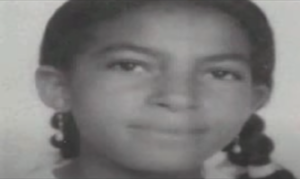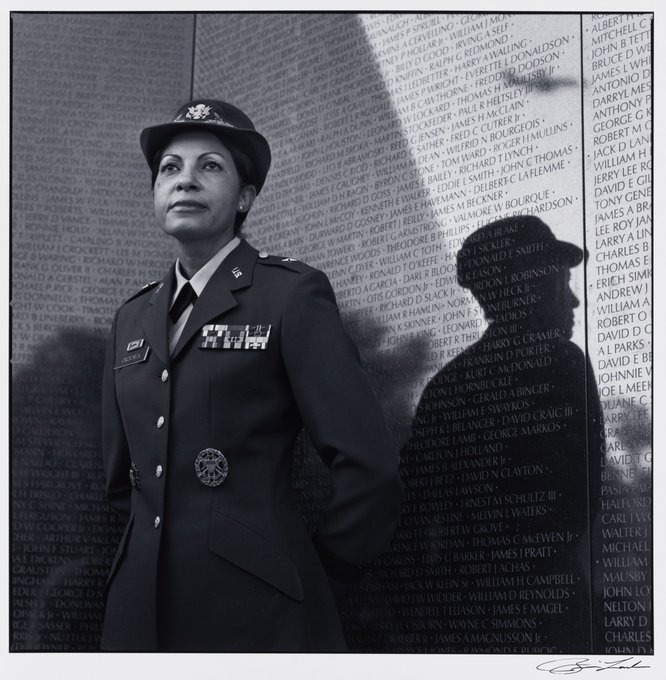SHERIAN GRACE CADORIA:
A WOMAN WHO REFUSED TO ACCEPT 'NO'

MICHELE J MARTIN
Sherian Grace Cadoria spent nearly three decades in the Army, a career she almost walked away from to join a convent after Vietnam. Knowing she had a gift, her mother convinced her to stay on the path and not give up her career. By the time Cadoria retired, she was the highest-ranking Black woman in the United States military — Brigadier General.

Born to tenant farm laborers in Marksville, Louisiana, Ms. Cadoria was raised by her mother and older siblings after a farm accident injured her father. Kicked in the head by a horse, he refused treatment. The brain trauma severely impacted his behavior, requiring him to be institutionalized until he died.
Sherian's mother moved her and her older siblings shortly after her father's hospitalization because the farm owner wanted a "man to do the work." They found a two-room house with no running water or electricity. Her mother papered the walls with Sears Roebuck catalog pages to reduce the drafts. They slept together in one room and ate and cooked in the other.
As soon as she could walk, Sherian was picking cotton with them in the fields. It would take her an entire day to fill a pillowcase in her first weeks. By the time she was 10, she was picking 250 pounds of cotton a day. Education was her way to a different life.
In Cadoria's junior year, she was selected as the sole recruit to represent Southern University at the Women's Army Corps College Junior training program. In the summer of 1960, she would travel to Alabama and spend four weeks at Fort McClellan, experiencing life as an enlisted soldier. Upon graduating from Southern University, Sherian Cadoria enlisted and received her commission as a Second Lieutenant in the Women's Army Corps.
When she began her career in the Army in 1961, there were jobs and duties she was not allowed to do because she was Black due to Jim Crow laws. When Vietnam began, Lieutenant Cadoria volunteered. Upon arriving in Vietnam, she was assigned to the military police. This assignment was unheard of at this time, as these were traditionally all-male units. This would be yet another first for her in her storied career.
"In Vietnam I interviewed for a protocol job. The colonel told me I couldn't do the job, 'You can't travel, you can't carry luggage, it's too heavy. Women can't do this.' And I said, 'Nobody said I couldn't carry those hundred-pound bags of cotton when I was just a little child.'
"By act of Congress, male officers are gentlemen, but by act of God, we are ladies. We don't have to be little mini-men and try to be masculine and use obscene language to come across. I can take you and flip you on the floor and put your arms behind your back and you'll never move again, without your ever knowing that I can do it."

Brigadier General Sherian Cadoria
— Kolby I (@Acesizzle_) July 2, 2020
Southern Alum #SUBR pic.twitter.com/HHLGvyOJ2x
Because of the suffering she saw in Vietnam, she was considering retiring from military service and becoming a Dominican Nun upon her return. Her mother told her, "God wanted you to be a soldier. You now have a responsibility." Cadoria agreed and was determined to be the best soldier she could be. Shortly after this conversation with her mother, she was notified of her selection to attend the Command and General Staff College— the first Black woman to do so.
"I've gotten more pressure from being female in a man's world than from being black. I was always a role model. I had responsibility not just for black women but for black men as well. A woman today has to do more than her male counterpart. I came in knowing I was going to have to give 200 percent effort to get 100 percent credit. Most of the time, you don't even get the 100 percent credit."
General Cadoria would continue her career in the Army. As previously stated, at the time of her retirement in 1990, she was the highest-ranking Black female in the United States Military. She paved the way for those that came after her, and today, Nadja West holds the honor of being the highest-ranking Black female in the U.S. military.
Cadoria was a trailblazer. In her twenty-nine year career she achieved the following firsts—
First women to serve as a military police officer
First woman to command an all-male battalion
First woman to lead a criminal investigation brigade
First woman admitted to the U.S. Army Command & General Staff College and the U.S. Army War College
First black female Brigadier General
First black female director of the Joint Chiefs of Staff
Highest ranking Black female in the US military upon her retirement in 1990
First woman and the First African-American inducted into the Louisiana Military Veterans Hall of Honor (2002)
CIVILIAN AWARDS
Horatio Alger Award — 2003
Spirit of Giving YWCA — 1999
National Athena Leadership Award — 1998
Woman of the Year - Business and Professional Women's Association —1998
MILITARY AWARDS
Three Bronze Stars for her 3-year tour of Vietnam
Air Medal for Meritorious Service at Cam Ranh Bay
Legion of Merit Medal
Defense Superior Service Medal
Four Army Commendation Medals
Louisiana Military Veterans Hall of Honor
Brigadier General Cadoria's vocal style is disarmingly soft, sweet, and warm. There is a gentle youthfulness to her voice, which makes her earlier quote about flipping someone on their back and disabling them genuinely fascinating. We love that she sounds like she'd bake you cupcakes. And while she likely would, knowing that Cadoria could also probably use those cupcakes as a weapon to protect us... wow, right? How amazing and inspiring is she?!
Voice matters to us. As speech scientists and technologists who work in voice technology, we spend a lot of time listening to voices and thinking about what they say, beyond just the words. We believe that all voices should be represented— in both the real and virtual worlds, not only in our communities but in our technology: our smart speakers, voice assistants, any applications using digital voices.
Imagine the possibilities if the world of digital voice matched the world of human voice. If it was as dynamic and expressive? If it was representative of the world we hear every day. If digital voice could sound authentic and nuanced and express everything that voices like Sherian Grace Cadoria's voice can? Guess what, it can — learn more about AI-Voice.
